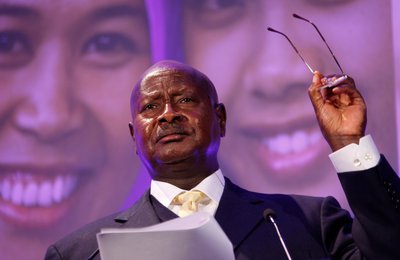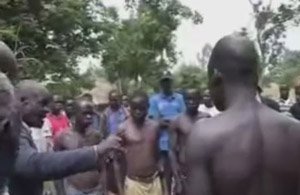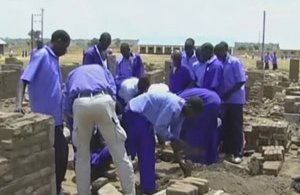Ugandans head to the polls in four days time to cast their ballot to elect a new president and members of parliament. The 18 February election this Friday is considered one of Uganda’s most hotly contested multiparty elections in the history of the country. Seven presidential candidates are vying to unseat Uganda’s longest serving leader, Yoweri Kaguta Museveni, and end his 26 year reign. Museveni has ruled Uganda since 26 January 1986. His rebel forces, the National Resistance Army (NRA) - now Uganda Peoples Defence Forces - took power after a five year long guerrilla struggle against Milton Obote and Tito Okello Lutwa. He has since abolished constitutional term limits in a move many predicted will allow him to “rule for life.” Past elections have been marked by violence, intimidation, and allegations of massive rigging. Many political observers, civil society organisations, and local peacebuilders, had warned that this election might turn violent but the campaigns have thus far been uncharacteristically “peaceful”. Stephen Oola, Uganda Local Correspondent, caught up with Charles Toolit Atiya, a local peace builder, and Coordinator of the Northern Uganda Transitional Justice Working Group (NUTJWG) to ask his views about the forthcoming elections. NUTJWG is a loose coalition of civil society actors working for peace, human rights, justice, reconciliation, and development within Acholi, Lango, Teso and West Nile sub regions.
Give us some updates on the election so far; what’s the timeline to declaration of results?
Yes, the election date has closed in, and compared to the previous elections of 2001, 2006, this particular election has been largely free of violence in most of the countryside as the candidates canvased for votes. At this stage it would be difficult or too soon to give credit to the electoral commission (EC) but from the surface, they seem to have taken good lessons from the past. One thing they have done differently is that a prior conference of all candidates was held where they agreed on their campaign schedules. One important feature of this was that no candidates could campaign in close vicinity of the other on a particular day. This hugely reduced the chances for opportunistic clashes as candidate supporters supposedly criss-crossed each other. This was backed by stiff electoral penalties that have confined election activities to the time of day and a strong deployment of an election police force. Thirdly, unlike in the past the EC has been proactive in engaging the media, and in the process has spent a staggering amount of money in radio media adverts. This must have been largely informed by the dramatic images of violence that marred majorly the National Resistance Movement Party primaries.
The other aspect to these elections has been the unprecedented litigation it has attracted. "One sterling one" has been a successful constitutional petition against members of parliament who crossed the flow. They have sought mandate outside the parties or the independent mandate they used during the previous elections. Concerning this a citizen sought interpretation from the court. The ruling that followed has witnessed 70 members of parliament at risk of losing their seats in parliament. Even at the moment there are glaring tensions among the proponents, as, to date most of the opposition have expressed no trust in the EC and the other agencies charged with preparing and managing the elections. The whole process appears to favour the incumbent and ruling party members with a large sum of money from state coffers channelled to bribing voters or outright buying of votes.One important feature of this was that no candidates could campaign in close vicinity of the other on a particular day.
What is your assessment of the entire election process to date and how will this affect the outcome?
When I look at what has happened during the past elections, this one is not going to be any different. First of all, almost all the opposition candidates have raised doubts concerning the fairness of the electoral process. In the run up of the previous two elections, Dr. Besigye (a candidate) went to court over the electoral circumstances. In both cases, although the overall ruling did not overturn the elections, the court observed that the EC failed in a number of its obligations to ensure a free and fair election. On this basis the opposition and other civic organisations have called for reform at the helm of the EC, but the sitting government has resisted any changes. So as you see, these and other factors, say the seemingly increasing involvement of the military are red lines. If not addressed, these are open triggers to a disputed result that can easily slip into violence.
Another problem is the missing commitment to a violence-free election. Both the incumbent and the main opposition flag bearers are speaking strongly (sounding war drums) without encouraging dialogue or peaceful means to resolving some of the contentious issues. For instance the opposition says they will go ahead and tally results, in response the incumbent warns of this move and promises to arrest opposition leaders. Arguably the EC is not very well prepared for this election and the atmosphere is highly charged, thus it may be well be too late for averting a violent election process.
As a peacebuilder, what is your greatest concern and why?
Uganda today, in my view is more divided more polarised than ever before. The northern and eastern parts of the country continue to wallow in untenable poverty despite overall impressive economic growth statistics. If you toured the country it would be difficult to believe that this is one country. Unfortunately, the division is being perceived to run along tribal lines by many ordinary people; this could pitch one group against the other. As if this was not enough, even the development of policies has been blind to the great tents of integration and cohesion for a nation to find its path to growth and success. A case in point was the proposed land reform policy that saw the Kabaka (King) of Buganda feeling targeted and being victim of the same policy. The recently introduced law on the involvement of traditional rulers in politics and on being partisan has only but divided the country further along tribal and religious lines.
How do you assess the contribution of local peacebuilders in influencing the electoral process to date?
Very dismal I must frankly say.
We live in a country where there is no respect for rule of law, so there is very limited environment for mutual conversation with the powers that be. On a very minimal extent, local peacebuilders have had great impact on their immediate communities. But this is discounted constantly by public policies and actions that only polarise the nation. For instance the corruption that goes on unabated at top government levels only but bread hatred. When twenty million shillings are lashed out to members of parliament just to win votes on contentious bills or give them a leverage to win, elections amount to nothing but impunity, especially when patients at the country’s main hospital Mulago, spend four weeks without seeing a doctor.
How committed are the different presidential and parliamentary candidates on addressing the continuing LRA conflict beyond our borders, and sustainable peacebuilding in post conflict societies?
Unfortunately, not a single candidate has put across clear points on how to deal with the LRA and the post-conflict challenges. Each one of them has made mention of the situation in the north, but it all turns out to be piecemeal approaches if one put into consideration the geo-political perspective to the conflict. In case of the sitting government, they could as well concede failure. Because ever since the failed LRA talks, not much is seen on the foreign policy plate. The LRA is freely roaming in both Sudan and Congo, let alone a famed military pursuit that led UPDF and joint forces to Central Africa Republic.
In terms of rebuilding the north in a post-conflict period, all I can say is that I heard someone on the other side of the telephone say NO INTEREST.
How have the candidates embraced issues of peace, justice, reconstruction, and national reconciliation?
Apart from an ambitious – and in my case an emotional – outburst from the part of government, that was presented in the Peace Recovery and Development plan, there isn’t anything else to write home about. It was to be a framework for development, peace and recovery, but was divorced at the very onset by the foreign donors who should have supported it, while the government – despite the gravity of the situation – hardly put any money in it. Even though there was a clear implementation plan and it was difficult to tell the difference between the usual overall government support and this intervention. Not to mention that the peace intended budget accounted for less than one percent of the overall budget. So people in LRA affected areas continue to fend for themselves. A majority has taken up on the task to rebuild their lives. Fortunately, many in the north did not expect the current government to do anything different.
What is your take on the events that happened in Tunisia and Egypt, and how may it affect the political landscape in Uganda?
To me the events of Tunisia and Egypt only put in perspective: who actually holds power in this relationship of those who rule and those that are ruled. And the message for Uganda is right on the wall. They either do it right or they go the Tunisia/Egypt way.
Stephen Oola, Uganda Local Correspondent. February 2011








